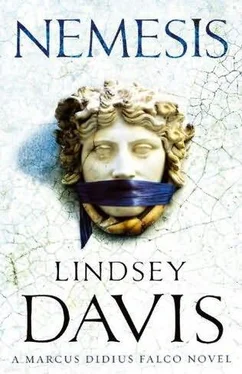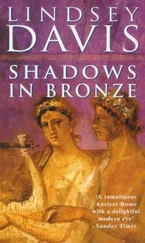Lindsey Davis - Nemesis
Здесь есть возможность читать онлайн «Lindsey Davis - Nemesis» весь текст электронной книги совершенно бесплатно (целиком полную версию без сокращений). В некоторых случаях можно слушать аудио, скачать через торрент в формате fb2 и присутствует краткое содержание. Жанр: Исторический детектив, на английском языке. Описание произведения, (предисловие) а так же отзывы посетителей доступны на портале библиотеки ЛибКат.
- Название:Nemesis
- Автор:
- Жанр:
- Год:неизвестен
- ISBN:нет данных
- Рейтинг книги:5 / 5. Голосов: 1
-
Избранное:Добавить в избранное
- Отзывы:
-
Ваша оценка:
- 100
- 1
- 2
- 3
- 4
- 5
Nemesis: краткое содержание, описание и аннотация
Предлагаем к чтению аннотацию, описание, краткое содержание или предисловие (зависит от того, что написал сам автор книги «Nemesis»). Если вы не нашли необходимую информацию о книге — напишите в комментариях, мы постараемся отыскать её.
Nemesis — читать онлайн бесплатно полную книгу (весь текст) целиком
Ниже представлен текст книги, разбитый по страницам. Система сохранения места последней прочитанной страницы, позволяет с удобством читать онлайн бесплатно книгу «Nemesis», без необходимости каждый раз заново искать на чём Вы остановились. Поставьте закладку, и сможете в любой момент перейти на страницу, на которой закончили чтение.
Интервал:
Закладка:
'All that is as may be!' Thalia could be worryingly firm. 'I am here to make arrangements. Things have to be set up properly.'
I gulped nervously.
'Here is the deal, Marcus Didius. When this child is born, it has to be looked after. Don't expect me to do it. I can't take a baby on tour with the circus! My animals -would be dangerously jealous, it's not hygienic, and I don't have the capacity.'
'That's very sad,' Helena interrupted. 'Children give so much pleasure and can be a comfort, Thalia.'
'He'll get in the way!' Thalia replied, as riotously honest as when she discussed her sex life. Then she dropped me in the midden. 'You will have to bring him up, Falco.'
'What?'
'I thought about it. This is what Geminus wanted. You know it is. He told you in that codicil: you were to see my baby as your own sister or your brother. You can't argue with a fideicommissum.' She was calm. She was composed. Before I could bluster excuses, Thalia added the death blow: 'The best thing will be, Marcus darling, if as soon as he is born, you take him off me and adopt him.'
I closed my eyes while it sank in. I had expected troubles to come with money. I knew some of them would be complex, many crushing. Cynical though I was, nothing of this magnitude had crossed my mind. There was no escape, however. Pa had landed me absolutely.
I said I had to consult Helena. 'That's right,' Thalia agreed composedly. 'Then the dear little thing can grow up with you two, and be part of your beautiful family.'
Those quick brown eyes of Helena's told me she foresaw everything, just as I did.
So I acquired a 'brother', who was almost certainly not my brother but whom I had to adopt and endure as my son. I would have shared the money with him fairly willingly, but now I had to give him a decent chance in life as well – - quite another proposition. This could only go wrong. Helena and I anticipated from the start that little Marcus Didius Alexander Postumus (as his mother would name him, poor noddle) could never be grateful. We would offer him a home, education, moral guidance and affection. Pointless. A soulless waste of effort. He would be difficult to raise and impossible to console for the arbitrary fate that had been dumped on him. He was bound to seethe with jealousy and resentment. And I would not even blame him..
Thank you again, Geminus.
LXI
There had been slaves pootling around us, but we dismissed them. Katutis did not even try to argue; he was learning.
We sat in the salon. Helena had moved things around while I was in Latium. We reclined on day-couches with bronze fittings. Cushions in soft shades of blue and aqua lay under our elbows. The walls, newly painted last year, were respectable tones of honey and off-white, plain panels delineated by fine tendrils and elegant candelabrum motifs, intermittently relieved with discreet miniature paintings of birds, done in faint brushstrokes. These were civilised, though unpretentious surroundings. With her own sure taste, Helena had scaled down from when my father lived here, using less grandeur than when he had the place bursting with antiques. The salon made a quiet setting for the sombre discussion we were about to hold.
Others soon joined us: first Albia, then Petronius and Maia. I had considered including Ma, but my habit of keeping secrets from her was too great. Helena rose to close the double doors for privacy. Before she resumed her seat, she stood for a moment: tall, wearing white with coloured bands and informal jewellery, just a matron at home, as ever on the edge of domestic harassment, always alert in case she was called away to scorched meat in the kitchen or bruises in the nursery. .. It would not happen today. Arrangements were in place. Here she was, the woman I loved, taking on the wider role of a Roman wife and mother: steering her family towards great decisions and the righting of intolerable wrongs.
I smiled at her faintly. She understood what I was thinking. I had made a good choice.
Helena said, 'This will be a family conference – in every sense, because we are all members of a family, and families are what we have to talk about. Nothing that is to be said in this room today may be mentioned outside it to anyone.'
'Sub rosa,' said Aulus.
'Isca rules,' nodded Petro.
'Our rules,' my ever-caustic sister Maia corrected him.
A formal family conference is the symbol of emergency in Roman society. It happens rarely, because it only happens after outside measures have been tried and have failed. A fallback when public systems have collapsed, it is used for both utterly private reasons and for arranging a challenge to political tyranny. This is the last meeting before assassinations, executions, exile or disgrace. This is where wives are summoned to account for adultery by stern old-fashioned husbands, then humiliating punishments levied with unpleasant aunts' encouragement. It is where necessary usurpation of rulers is plotted. Where suicide or honour killing is carried out, after rape or other violation.
Our family council was where seven of us, my closest and dearest, assembled to unpick the full connection between the Claudii and Anacrites. Then we would decide what to do about it.
First, Quintus reported events in Latium. I watched him, tall, still boyish in appearance though increasingly firm in manner. He had his father's straight rather spiky hair, his mother's bearing and good looks. He was more slightly built than his brother, though Aulus had lost weight since his marriage: stress, presumably.
Quintus was concise, his tone almost pleasant. He could have been assessing routine logistics for a fort commander in a frontier province, as he concluded: 'We never had a chance to interrogate Claudius Nobilis. Everything else about him has to be conjectural – - except one thing: his eyes. After he died, Marcus and I noticed they were odd. Nobilis had pale eyes, eyes that were neither one colour nor another. Part grey, part brown. Extremely unusual.'
I heard Maia catch her breath as she made the link. Albia was twisting her hands in her lap.
'Neither of the twins, nor Probus, had that aberration,' Quintus continued, after a quick glance at Maia. 'Marcus and I checked the survivors. But we all know one other person whose eyes look two-coloured with some tricks of the light: Anacrites.'
Helena took up the story, taking the narrative from her brother as smoothly as the sacred torch is passed in a Panathenian relay race. 'This explains many things. Let us go back to two slaves on an imperial estate in the days of the early Empire: Aristocles and Casta. Of course they could not marry while they were in slavery, but let's assume they met, matched and even perhaps began to have children then. They were freed, some say to get rid of them because they were so difficult. They had many offspring. Some died. Some of the girls broke away, at least partly, and married. The eldest was Justus, who died not that long ago, perhaps of a bad conscience. Nobilis was among the youngest, pushed out more, perhaps; having to jostle more for attention, maybe even for clothes, space and food.'
My turn. 'One of the boys was called Felix. His brother Probus sneered: Felix, the happy and fortunate – - and a clever little sod too; well we lost him early, naturally… How did they "lose" him? We know now. When he was three years old his intelligence was officially noticed and he was removed from the family. In Rome, he was arbitrarily assigned a new name. It happens to slaves. So the man we know as Tiberius Claudius Anacrites began life as Claudius Felix. He may not always have remembered where he came from – - but he certainly knows now.'
At that point, it was Maia, Maia who might have been expected to be harshest, who put in a word for him. 'Imagine how it might have been for a child so young to be forcibly removed from the people he thought were his own.' Shaking her head, she went on in a low voice, 'Aristocles and Casta may have been distant, even violent, as parents, but I dare say they screamed and shouted when they had to give him up. From what we know, they were possessive; he was theirs, their property.'
Читать дальшеИнтервал:
Закладка:
Похожие книги на «Nemesis»
Представляем Вашему вниманию похожие книги на «Nemesis» списком для выбора. Мы отобрали схожую по названию и смыслу литературу в надежде предоставить читателям больше вариантов отыскать новые, интересные, ещё непрочитанные произведения.
Обсуждение, отзывы о книге «Nemesis» и просто собственные мнения читателей. Оставьте ваши комментарии, напишите, что Вы думаете о произведении, его смысле или главных героях. Укажите что конкретно понравилось, а что нет, и почему Вы так считаете.












